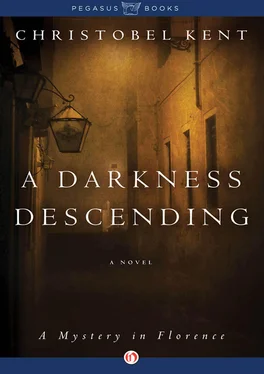Christobel Kent - A Darkness Descending
Здесь есть возможность читать онлайн «Christobel Kent - A Darkness Descending» весь текст электронной книги совершенно бесплатно (целиком полную версию без сокращений). В некоторых случаях можно слушать аудио, скачать через торрент в формате fb2 и присутствует краткое содержание. Год выпуска: 2013, ISBN: 2013, Издательство: Corvus, Жанр: Криминальный детектив, на английском языке. Описание произведения, (предисловие) а так же отзывы посетителей доступны на портале библиотеки ЛибКат.
- Название:A Darkness Descending
- Автор:
- Издательство:Corvus
- Жанр:
- Год:2013
- ISBN:9780857893260
- Рейтинг книги:5 / 5. Голосов: 1
-
Избранное:Добавить в избранное
- Отзывы:
-
Ваша оценка:
- 100
- 1
- 2
- 3
- 4
- 5
A Darkness Descending: краткое содержание, описание и аннотация
Предлагаем к чтению аннотацию, описание, краткое содержание или предисловие (зависит от того, что написал сам автор книги «A Darkness Descending»). Если вы не нашли необходимую информацию о книге — напишите в комментариях, мы постараемся отыскать её.
A Darkness Descending — читать онлайн бесплатно полную книгу (весь текст) целиком
Ниже представлен текст книги, разбитый по страницам. Система сохранения места последней прочитанной страницы, позволяет с удобством читать онлайн бесплатно книгу «A Darkness Descending», без необходимости каждый раз заново искать на чём Вы остановились. Поставьте закладку, и сможете в любой момент перейти на страницу, на которой закончили чтение.
Интервал:
Закладка:
‘What was he like?’ Luisa said mildly. Giusy sat back in her chair and her face took on the expression — so unusual for her that for a moment Luisa couldn’t work out what the problem was — of effortful thought. ‘Grubby,’ she said eventually. ‘Untidy, always a rip in his coat, trousers too big. Nobody liked him.’
‘Huh,’ said Luisa, remembering the bonneted baby and wondering how it had escaped that attentive dictator of a mother so far as to become a scruffy child. But then again, she was surprised at the mother sending him to that school; she’d have thought the woman would have scrimped to send him to the nuns in Piazza San Felice, where the children wore little pinafores.
‘Nobody liked him,’ Giusy repeated.
Well, Luisa could see that fastidious Giusy wouldn’t have: she was still frowning, though. ‘Not just me. Not just — really nobody. He was odd. He didn’t care what people thought of him. And he was — that kind of clever, you know. The kind that keeps people out.’
It was character analysis of a kind Luisa had never heard from Giusy before, and she stared. Giusy put out her hand for the newspaper, and as Luisa conceded it the electronic squeal of the door upstairs sounded. Giusy paid no attention, staring instead at the page.
‘I thought he’d had a kid,’ she said slowly. ‘Where did I hear that?’
‘So someone didn’t mind the holes in his clothes,’ said Luisa drily, getting to her feet. Sometimes, working in a place like this with someone like Giusy, she wondered about whether a lifetime of looking after her appearance — not to mention her customers’ — might have been a little misguided. Even if such a suggestion might shake some sectors of society to their foundations.
‘Yeah,’ said Giusy absently, tapping the page with a long pink nail. ‘Someone. Who did he marry, then?’
From upstairs Beppe was calling: still Giusy gazed down at the page.
‘I’ll go then, shall I?’ said Luisa, turning away without waiting for an answer.
On the stairs she could hear a voice she recognized talking to Beppe, although in an unfamiliar register. Higher than usual, with an anxious politeness in it.
‘Yes,’ the woman was saying distractedly. ‘And how is your sister, Giuseppe?’ No one called Beppe ‘Giuseppe’, at least not for twenty years they hadn’t.
‘Gloria?’ said Luisa, with disbelief, stepping on to the shopfloor.
Pietro’s wife, round, red-headed Gloria Cavallaro, who never shopped for clothes anywhere but the old-fashioned place on the road where they lived, with its window display of lace nighties and sensible sweaters. What could she be doing here? Gloria turned helplessly towards her.
Luisa held out her hands without thinking; there was something more in Gloria’s expression than unease at how out of place she was in the dress she obviously wore for cleaning the house, here on the dove-grey carpet and amongst the expensive black cocktail wear.
‘What is it, Gloria?’ She was ten years younger than Luisa but her pretty, usually animated face looked worn and pale, freckles standing out against the white skin. She was clasping her hands together and turning them over distractedly.
Tactful as ever, Beppe stepped back from them, nodding towards menswear upstairs, and with a flick of her head, Luisa said, ‘Yes, go.’
‘Has something happened, Gloria?’ Pulling her hand gently, folding the other woman close to her on instinct. She thought of Sandro’s impenetrable message, and of more things that might go wrong. ‘Pietro?’ she said, faltering. She had spent enough years fending off anxiety during Sandro’s time in the force to know how that felt.
Gloria looked up: she smelled of violets, this close, her face only centimetres from Luisa’s. ‘Not Pietro,’ she said. ‘It’s Chiara.’
Chapter Five
The lawyer’s office, like the lawyer himself, was unexpected. In the untidy room, heaped with papers, the bookshelves overflowing into teetering stacks on the floor and chairs, Giuli watched Sandro for his reaction.
The man himself — Carlo Bastone, the prop and right-hand man — suited the room. Short, stocky, rumpled, a substantial belly pushing at the buttons of a knitted waistcoat over which a badly knotted tie sat skewiff. He held out his hand hesitantly to Sandro as he came around from behind a desk mostly hidden under the same landslide of paper that looked as if it had only recently come to rest in the room.
Looking from one face to the other, Giuli saw both men take each other in and relax, in Sandro’s case only fractionally.
Carlo Bastone looked uncertain, as well he might. Giuli had been garbled in her explanation, on the phone, of why they needed to talk to him. ‘Niccolo’s fine,’ he’d repeated over and over again. ‘Why do you need to see me? There’s nothing to worry about.’ She’d said something about wanting to help, about strategy for the press, and he’d gone quiet. It was only when she’d told him she was Enzo’s girlfriend that he’d agreed.
They loved Enzo, the Frazione. Perhaps for the same reasons Giuli loved him.
Because he was good. Because he thought only of others: of his mother’s catalogue of minor complaints, his father’s emphysema, of Giuli’s night terrors. When she’d sit up straight in bed, gasping for air, trying to remember the thing she’d forgotten, or left behind to die.
And when Rosselli had gone down like a ninepin on the stage it was Enzo who, having established that Giuli was all right and safely at the edge of the room, had worked his way doggedly through the crowd until he reached the man lying motionless on the wooden platform. It had been Enzo, earnest under the daft haircut that Giuli had learned to love, who’d laid him on his side in the recovery position, and had cleared a space around him and loosened his shirt. Checked his breathing until, after what seemed like hours, Niccolo Rosselli had begun to move.
It had been Enzo, fretting all night afterwards, who had impelled Giuli all the way here, nagging Sandro along too, calling and begging the lawyer to see them.
‘A strategy for the press?’ On the telephone Bastone had seemed surprisingly unworldly, for a man who’d gone all the way through law school and written learned papers on all sorts of things. He didn’t even have a secretary to field his calls. But the words did seem to be getting through. ‘Do you think we need that?’
Now he turned from Sandro to Giuli, his expression brighter. ‘Miss Sarto,’ he said, and an eager note entered his voice. ‘I did wonder — what you said about the press. As you know, we don’t have a press office-’ And at this he looked around himself at the shambles of his office as though wondering how it had all got there. ‘Perhaps you — perhaps we do need one.’
‘I’d say,’ Sandro broke in, ‘I’d say that right now you do. You — I mean your Frazione — you need someone to tell people what’s going on.’
Giuli saw Bastone’s face cloud. ‘Well,’ he began hesitantly.
‘Or don’t you know yourself?’ said Sandro, and it was quite apparent by the despondency with which Bastone sat down abruptly, in a small puff of dust, that Sandro had hit the nail on the head.
They stood, waiting, until eventually Bastone looked back up and said, ‘Oh. Yes. Do sit down.’
They extracted two rickety chairs from the mess and sat with him around a table overflowing with paper. Giuli sat on the edge of hers. ‘Is he really all right?’ she said. Sandro sat back a little, arms folded, watching Bastone. In a silver frame on the shelf behind the lawyer was the portrait of a sweetly smiling elderly woman: his mother, presumably.
Bastone stood up again, and went to the long, dusty window. He stood there a moment in the soft late-summer light, looking down into the street.
Читать дальшеИнтервал:
Закладка:
Похожие книги на «A Darkness Descending»
Представляем Вашему вниманию похожие книги на «A Darkness Descending» списком для выбора. Мы отобрали схожую по названию и смыслу литературу в надежде предоставить читателям больше вариантов отыскать новые, интересные, ещё непрочитанные произведения.
Обсуждение, отзывы о книге «A Darkness Descending» и просто собственные мнения читателей. Оставьте ваши комментарии, напишите, что Вы думаете о произведении, его смысле или главных героях. Укажите что конкретно понравилось, а что нет, и почему Вы так считаете.












